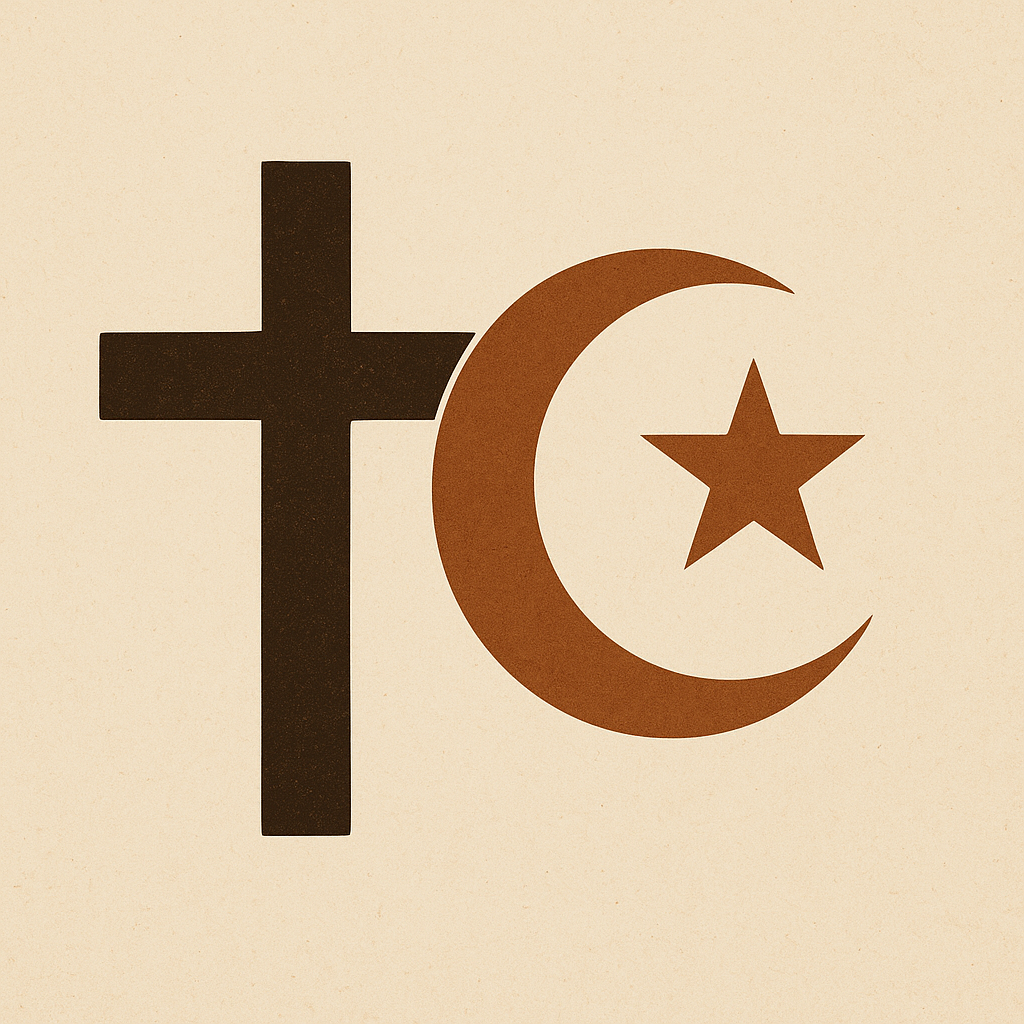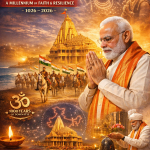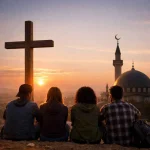✝️☪️ Christianity and Islam: Shared Roots, Divergent Paths
By Religion World Feature Desk
Two of the world’s most influential faiths — Christianity and Islam — together shape the beliefs of more than half of humanity. Their stories span continents and centuries, inspiring civilizations, guiding moral codes, and fueling debates about faith, reason, and coexistence.
At first glance, the differences seem vast — churches and mosques, priests and imams, the cross and the crescent. But look closer, and beneath the surface lies a shared spiritual ancestry and an enduring dialogue about God, humanity, and salvation.
🌿 Common Ground: One God, One Message
1. Monotheism at the Core
Both faiths are rooted in the belief in one, all-powerful, merciful God — the Creator and Sustainer of all.
Christians call Him God or Yahweh.
Muslims call Him Allah — the Arabic word for “The God.”
Both emphasize that this divine being is eternal, beyond human comprehension, and the ultimate judge of right and wrong.
2. Abraham — The Common Patriarch
Both religions trace their spiritual heritage to Prophet Abraham (Ibrahim), revered as the father of faith.
In Christianity, Abraham is a model of faith who trusted God’s promise.
In Islam, he’s honored as a prophet and the builder of the Kaaba in Mecca with his son Ishmael.
This shared ancestry is why both are called Abrahamic faiths — along with Judaism, their elder sibling.
3. Reverence for Jesus (ʿĪsā)
Jesus stands as a central figure in both faiths, though understood differently.
In Christianity, Jesus is the Son of God, the Messiah, and the Savior who died for humanity’s sins and resurrected.
In Islam, Jesus (ʿĪsā) is a prophet, born of the Virgin Mary (Maryam), performing miracles by God’s will — but not divine himself.
Muslims believe he was not crucified, but raised to heaven by God and will return before the Day of Judgment.
4. Scriptures and Prophets
Both faiths believe that God revealed His will through prophets and scriptures.
Christians follow the Bible, composed of the Old and New Testaments.
Muslims follow the Qur’an, revealed to Prophet Muhammad (peace be upon him) as the final and complete word of God.
Prophets like Noah, Abraham, Moses, and David appear in both the Bible and the Qur’an — showing just how interwoven their spiritual narratives are.
5. Ethics and the Afterlife
Both religions teach moral accountability: that actions in this world determine one’s fate in the next.
Christians and Muslims alike believe in Heaven (Paradise) and Hell, in divine judgment, and in living righteously through faith and good deeds.
Compassion, charity, forgiveness, and humility form the core ethical pillars in both paths.
⚖️ Diverging Paths: Where Beliefs Divide
1. The Nature of God and the Trinity
This is the sharpest theological divide.
Christianity believes in the Trinity — one God in three persons: Father, Son, and Holy Spirit.
Islam strictly upholds Tawḥīd — God’s absolute oneness, rejecting any division or association of partners.
For Muslims, God has no equals or offspring. For Christians, Jesus embodies God’s love and presence among humankind.
2. Jesus: Divine or Prophet?
Christianity rises on the belief that Jesus is God incarnate, whose crucifixion and resurrection bring salvation.
Islam, meanwhile, sees Jesus as a prophet, not divine — respected, miraculous, but fully human. Salvation, in Islam, comes not from a sacrifice, but through faith in one God, righteous deeds, and divine mercy.
3. Scripture and Authority
The Bible — especially the New Testament — is central to Christian life and liturgy. Christians see it as inspired by the Holy Spirit.
The Qur’an is Islam’s final revelation, believed to be literally the word of God, preserved in its original form in Arabic.
Islam also recognizes earlier scriptures (Torah, Psalms, Gospel) but teaches that human alterations led to the Qur’an’s revelation as the ultimate clarification.
4. Clergy and Worship Structure
Christianity has an established clergy — priests, bishops, pastors — often organized hierarchically (especially in Catholicism and Orthodoxy).
Islam has no formal clergy — imams lead prayers and scholars interpret law, but every Muslim is directly accountable to God.
Worship also differs:
Christians gather on Sunday, often with sacraments like communion or baptism.
Muslims pray five times daily, gather on Fridays, and follow rituals like fasting in Ramadan and pilgrimage (Hajj).
5. Salvation and Grace
In Christianity, salvation is a gift of grace through faith in Jesus Christ — “not by works, but by belief.”
In Islam, salvation is achieved by faith coupled with good deeds, obedience to God, and seeking forgiveness.
Both see God’s mercy as the ultimate key — but the path to it is defined differently.
🌎 Beyond Theology: Shared Challenges and Modern Dialogue
In a globalized, interconnected world, Christianity and Islam face similar struggles — secularism, materialism, and internal reform.
Modern interfaith efforts — from the Vatican’s dialogues with Muslim scholars to grassroots peace initiatives in Asia and Africa — echo a growing realization:
The world doesn’t need competing faiths; it needs cooperating believers.
🕊️ Conclusion: Two Paths, One Divine Horizon
Christianity and Islam began as parallel quests to bring humans closer to the divine — to live with compassion, humility, and justice. Their differences may define their theology, but their shared values define their humanity.
In the end, both faiths whisper the same truth:
“There is but one God — and to Him, we all return.”










